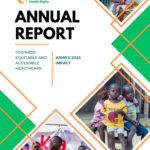In many societies, traditional notions of masculinity have long been associated with strength, authority, and dominance. These gender norms often place men as the primary decision-makers even on household health issues. This can inadvertently perpetuate inequalities, especially relating to women’s health. The Gender Model Family (GMF) approach is a transformative approach to encourage men to support women’s health and gender equality actively.
Redefining Masculinity through the GMF Approach
ARHR’s adoption of the GMF approach promotes men as strong allies in advancing women’s health and well-being. It does so by engaging families and working closely with them to foster a deeper understanding of women and girls’ barriers in accessing healthcare. Through 9 partners, ARHR is engaging about 900 families from 5 communities in 2 districts of each partner organization to empower men to support women in roles that have traditionally been seen as women’s, sharing access and control of resources with women, and recognizing the triple burden women often bear in managing households, caring for children, and maintaining the health of the family.
ARHR employs this model, as part of its ‘Putting Women and Girls at the Centre of PHC’ initiative, because redefining masculinity involves men stepping into supportive roles that were once considered outside the realm of “masculine” duties. By supporting women, men can help to alleviate the overwhelming burden on women and allow them to focus on their health and reduce their risk of disease and illness. This will benefit the family, as healthier women adequately contribute to the well-being of their families and communities.
Men as Advocates for Women’s Health
Men become better advocates for women’s health when they embrace that supportive role. They challenge harmful gender norms that have historically restricted women’s access to healthcare. Instead, the idea that women’s health should matter to the family and community is promoted. Men can support women’s leadership in health decision-making and ensure their voices are heard and their health needs are prioritized. This collective effort can lead to more gender-responsive health services, improved access to health care for women and girls, and ultimately, more equitable health outcomes for communities.
The Impact of ‘Redefining Masculinity’
The GMF approach to redefining masculinity has far-reaching implications for community health. As men become more involved in promoting women’s health and gender equality, they help to create a culture of shared responsibility within families. This not only improves health outcomes for women and girls but also strengthens the overall fabric of the community by fostering a more inclusive and supportive environment. When men actively promote gender equality, they set a powerful example for the next generation. Boys who grow up seeing the male community and its leadership advocating for women’s health and sharing in household responsibilities are more likely to adopt these values. This generational shift can create lasting change, leading to more equitable and healthy communities.
Conclusion
The GMF approach, a pioneering approach facilitated by Send Ghana, highlights men’s crucial role in advancing women’s health and promoting gender equality. Barriers that hinder women’s access to healthcare are dismantled when men become allies. Stronger and more resilient communities are created when men support and advance women’s health.



